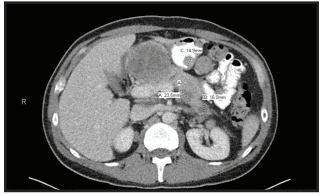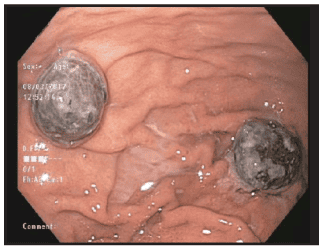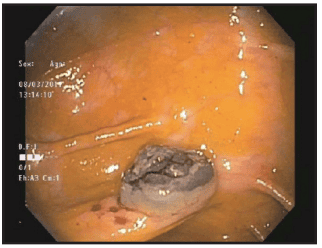This is an automatically translated article.
Posted by Master, Doctor Mai Vien Phuong - Department of Examination & Internal Medicine - Vinmec Central Park International General Hospital
Metastatic gastrointestinal (GI) melanoma poses a unique clinical challenge. Previously thought to be rare, many patients have metastatic disease at autopsy but rarely have gastrointestinal symptoms.
1. Overview of melanoma metastatic to the gastrointestinal tract
In the age of targeted immunotherapy capable of rapidly reducing the size of space-occupying lesions in the gastrointestinal tract, case reports of intestinal perforation have emerged as unforeseen complications. be of treatment. The following case of a patient treated with immunotherapy for malignancies with known gastrointestinal metastases highlights the importance of clinical evaluation before initiating vigorous immunotherapy and Patients risk stratification for potential treatment complications.
2. Clinical case
A 57-year-old man presents with complaints of postprandial epigastric pain over the past month as well as unintentional weight loss of approximately 5 kg. His past medical history was unremarkable. His physical examination revealed a normal abdominal examination, with no tenderness to palpation or palpable mass. Initial tests include: Transaminase aspartate (AST) of 56 (units/L), alanine transaminase (ALT) of 65 (units/L) and alkaline phosphatase of 192 (IU/L), with normal bilirubin , normal INR ratio and normal platelet count. He was seen by a gastroenterologist, and an upper endoscopy and colonoscopy were scheduled to evaluate his abdominal pain. Meanwhile, abdominal ultrasound revealed multiple large masses in the peritoneal cavity. Subsequent computerized tomography of the abdomen and pelvis revealed numerous tumors scattered in the peritoneal cavity, mesentery, retroperitoneum and peritoneum, pancreatic tissue as well as peritoneal and intraluminal lesions. thick. The primary lesion cannot be identified.



3. Symptoms of melanoma metastatic to the gastrointestinal tract
It is now recognized that melanoma often metastasizes to the gastrointestinal tract, infrequently causing symptoms. At autopsy of 100 patients with cutaneous melanoma without gastrointestinal symptoms, more than half had metastatic lesions in the small intestine, and about one-quarter had lesions in the stomach and colon (e.g., colon). colon). Gastrointestinal metastases show a poor prognosis, with a median survival time of 4-6 months. For symptomatic disease, including intussusception and obstructive symptoms, the consensus is that surgical intervention is indicated for palliation. However, there are currently no recommendations to investigate gastrointestinal disease in asymptomatic patients as this does not usually alter clinical management.
4. The role of targeted therapy
With the development of more targeted therapies for melanoma, particularly with biologic therapy including PD-1 or CTLA4 inhibitors, case reports have emerged identifying intestinal perforation as a complication of a strong reaction to these potent therapies. In the age of targeted immunotherapy, it is possible that asymptomatic lesions can cause unforeseen treatment complications. Whether gastrointestinal disease should be investigated or ruled out prior to treatment with these new agents remains to be elucidated. It would seem clinically prudent that these patients should be carefully examined for any gastrointestinal symptoms prior to initiating immunotherapy to stratify risk for adverse events. This can be devastating if not completely preventable.
In Vietnam, Vinmec Times City International General Hospital is the unit that applies and performs immunohistochemistry with modern equipment to perform the latest generation of immunohistochemistry techniques - histochemical staining machine. Bench Mark XT automatic immunoassay, a modern machine, according to the standards of the World Health Organization (WHO), in order to diagnose the disease quickly and accurately, serving the prognosis and treatment orientation for most patients. all types of cancer. The hospital also has a full range of immunological markers and especially has a team of experienced and technical doctors that bring high efficiency to patients.
If you have a need for consultation and examination at Vinmec Hospitals under the national health system, please book an appointment on the website for service.
Please dial HOTLINE for more information or register for an appointment HERE. Download MyVinmec app to make appointments faster and to manage your bookings easily.
References
Dilling P, Kruszewski WJ, et al. Multiple colon perforation as a fatal complication during treatment of metastatic melanoma with ipilimumab - case report. Pol Przegl Chir. 2014;86(2):94-6. Blecker D, Kochman ML, et al. Melanoma in the gastrointestinal tract. Am J Gastroenterol.1999 Dec;94(12):3427-33. Schuchter LM, Green R, Fraker D. Primary and metastatic diseases in malignant melanoma of the gastrointestinal tract. Curr Opin Oncol. 2000;12(2)181-185. Batus M, Kaufman HL, et al. Optimal Management of Metastatic Melanoma: Current Strategies and Future Directions. Am J Clin Dermatol. 2013:14(3): 179–194. Joseph P. Kingsbery, David M. Poppers, Complicated Metastatic Melanoma to the Gastrointestinal Tract, Practical gastroenterology • november 2017














